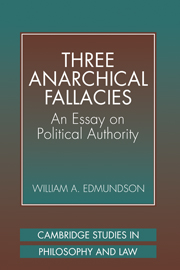Book contents
- Frontmatter
- Contents
- Acknowledgments
- Introduction
- Part One The Fallacious Argument from the Failure of Political Obligation
- 1 Legitimacy and the Duty to Obey
- 2 The Correlativity Thesis
- 3 Legitimate Political Authority
- Part Two The “Law Is Coercive” Fallacy
- Part Three The Inner Sphere of Privacy Fallacy
- Conclusion: The State for What?
- Index
3 - Legitimate Political Authority
from Part One - The Fallacious Argument from the Failure of Political Obligation
Published online by Cambridge University Press: 19 March 2010
- Frontmatter
- Contents
- Acknowledgments
- Introduction
- Part One The Fallacious Argument from the Failure of Political Obligation
- 1 Legitimacy and the Duty to Obey
- 2 The Correlativity Thesis
- 3 Legitimate Political Authority
- Part Two The “Law Is Coercive” Fallacy
- Part Three The Inner Sphere of Privacy Fallacy
- Conclusion: The State for What?
- Index
Summary
The central or criterion element of the correct view of political legitimacy is the Modest Legitimacy Thesis. The correct view accepts the Strong Authority Thesis but is not wedded to the Strong Legitimacy Thesis – which it rejects – because the correct view embraces the Proximity Thesis instead of the Warranty Thesis. The correct view does not lead to philosophical anarchism because the Modest Lemma needed in order to reach philosophical anarchism is false. The correct view reconciles the tension within the Inconsistent Triad of Chapter 1 by modifying its first and second propositions. The correct view replaces the Inconsistent Triad with the following, true and consistent, triad:
A state is legitimate only if it claims to impose on its subjects a general, at least prima facie, duty to obey its laws and its subjects have a general prima facie duty not to interfere with their enforcement.
There may be no general, even prima facie, duty to obey the laws of a state, not even those of a just state; but there is a general prima facie duty not to interfere with the administration of the laws of a just state.
Legitimate states are not only possible, but actual.
A defense and explanation of this view can begin with a refutation of the Modest Lemma. The Modest Lemma states that no one has any unconsented, even prima facie, general duty to refrain from resisting an authoritative directive as such. The Modest Lemma holds, in other words, that there is no general duty of noninterference with the enforcement of the laws, even those of a just state.
- Type
- Chapter
- Information
- Three Anarchical FallaciesAn Essay on Political Authority, pp. 48 - 70Publisher: Cambridge University PressPrint publication year: 1998

